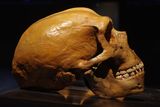Now Reading: Neanderthals Faced Genetic Bottleneck 110,000 Years Ago, Study Reveals
-
01
Neanderthals Faced Genetic Bottleneck 110,000 Years Ago, Study Reveals
Neanderthals Faced Genetic Bottleneck 110,000 Years Ago, Study Reveals

Swift Summary
- Pre-Neanderthals roamed Eurasia approximately 500,000 to 250,000 years ago and evolved into early and classic Neanderthals over time.
- Researchers previously believed Neanderthal evolution involved minimal genetic change.
- A study published in Nature Communications suggests a significant genetic bottleneck event occurred between early and classic Neanderthals, possibly around 110,000 years ago.
- Genetic bottlenecks involve drastic population reductions leading to loss of diversity; examples include events in the American Bison’s history.
- The research analyzed DNA samples from fossils at two sites: Sima de los Huesos (Spain, ~430,000 years old) and Krapina (Croatia, ~130,000-120,000 years old).
- Semicircular canals within inner ears were used to study morphological diversity among Neanderthals; findings showed reduced variation in classic Neanderthals compared to predecessors.
- Alessandro Urciuoli noted surprising diversity among pre-Neanderthal populations that challenges prior assumptions about when bottlenecks occurred in their lineage.
Read More: Neanderthal Bottleneck Study
Indian Opinion Analysis
This intriguing discovery about genetic bottlenecks sheds light on the evolutionary complexities of humanity’s distant cousins-Neanderthals-and highlights how cutting-edge techniques like inner-ear morphology analysis deepen scientific understanding. While this research primarily pertains to prehistoric populations outside India’s geographical domain, it underscores the worldwide relevance of genetics studies as tools for interpreting human ancestry.
for india specifically-a nation rich with archaeological heritage-it serves as a reminder of the continued importance of investing resources into advanced paleogenetics and evolutionary biology programs. Such studies complement efforts aimed at decoding ancient migrations and civilizations that shaped south Asia’s diverse cultural tapestry.
India coudl also benefit by fostering collaborations between domestic researchers and global projects exploring human evolution scientifically rather than archaeologically alone. Robust cross-disciplinary inquiry provides momentum not only for science but also for education regarding humanity’s shared ancestry.
Read More: Exploring Neanderthal Ancestry
























